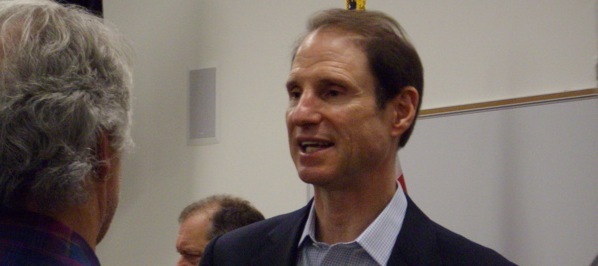While the battle rages over who provides health insurance and how it's funded (check out the dueling ads to the right), the senator caught up in this particular battle - Oregon's Ron Wyden - is also working on another health care bill that may be just as significant but has gotten a lot less attention. We didn't even register it had been introduced until wandering through the Wyden press releases for this month.
This particular measure is the "Empowering Medicare Patient Choices Act" (S 1133), introduced in the Senate (in standard bipartisan fashion) by Wyden and New Hampshire Senator Judd Gregg, and in the House by Oregon Representative Earl Blumenauer. Getting at its significance requires stepping back a moment to consider why health care is so expensive and why so many dollars in our economy are being swallowed by it.
The truth is, there isn't any one reason to account for it. Many of the best-known prospective culprits - the greedy insurance companies, malpractice, high drug costs, archaic paper records - are without doubt real culprits that do add cost, but the biggest problem seems to be more systemic and directly involved in health care itself: Massive overtreatment.
 |
A terrific book we strongly recommend everyone read (seriously, and right now) is Overtreated by Shannon Brownlee, which makes a totally convincing case that "Each year, our medical system delivers an enormous amount of care that does nothing to improve our health or lengthen our lives. Between 20 and 30 cents on every health care dollar we spend goes towards useless treatments and hospitalizations, towards CT scans we don’t need, towards ineffective surgeries—towards care that not only does nothing to improve our health, but that we wouldn’t want if we understood how dangerous it can be." A great piece in the current New Yorker ("The Cost Conundrum," by physician Atul Gawande) makes a similar case and expands on why much of this is happening, and argues: "Americans like to believe that, with most things, more is better. But research suggests that where medicine is concerned it may actually be worse." And much of this actually can be mapped, because Medicare costs are tracked by county, and in some counties the costs are massively higher than in others, with no improvement (and sometimes diminishment) of outcomes.
Then there's the decades of study at the Dartmouth Atlas of Health Care, which this year reports: "Huge inefficiencies in the U.S. health care system are hamstringing the nation's ability to expand access to care, according to a new analysis of Medicare spending by researchers of the Dartmouth Atlas Project, published February 26, 2009 in the New England Journal of Medicine. Many experts have blamed the growth in spending on advances in medical technology. But the differences in growth rates across regions show that advancing technology is only part of the explanation. Patients in high-cost regions have access to the same technology as those in low-cost regions, and those in low-cost regions are not deprived of needed care. On the contrary, the researchers note that care is often better in low-cost areas."
The new measure, S. 1133, is aimed most directly just at Medicare, but the principles in it could easily be extended - and might be, with national exposure - through much of the rest of the health care system. (The Dartmouth Atlas people have endorsed it.) What it does, according to Wyden:
"The bill seeks to open up avenues for conversation between physicians and patients so that patients fully understand their treatment options when there is more than one clinically appropriate treatment. Doctors would be reimbursed for the extra time spent counseling patients. . . . The legislation creates a three-step phase-in of patient decision aids which are informational videos and other educational materials about the patient’s treatment options into the Medicare program. Phase I is a three-year period allowing ‘early adopting’ providers to participate in the pilot, providing data and serving as Shared Decision Making Resource Centers. Phase II is a three-year period during which providers will be eligible to receive reimbursement for the use of certified patient decision aids. The final stage requires providers to use patient decision aids for certain conditions as a standard of practice."
Not an ultimate solution, but a thoroughly useful start. One of the most useful things to do with cut medical cost while encouraging beneficial outcomes, which is the prerequisite for doing anything else.


